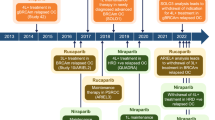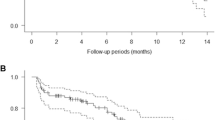Abstract
Sipuleucel-T is an autologous active cellular immunotherapy used in the treatment of men with asymptomatic or minimally symptomatic metastatic castration-resistant prostate cancer (CRPC). It is the first therapeutic cancer vaccine to receive US FDA approval.
Approximately 3 days prior to each infusion of sipuleucel-T, patients undergo a leukapheresis procedure for collection of autologous peripheral blood mononuclear cells. Preparation of sipuleucel-T involves enrichment for antigen-presenting cells from the leukapheresis product and activation ex vivo with a recombinant fusion protein (PA2024).
In the randomized, double-blind, placebo-controlled IMPACT study in patients with metastatic CRPC, sipuleucel-T was associated with a 22% relative reduction in the risk of death (hazard ratio 0.78; p = 0.03), which was the primary endpoint of the trial. After a median follow-up period of 34.1 months, median survival was 4.1 months longer with sipuleucel-T than placebo (25.8 vs 21.7 months). There was no significant between-group difference for the median time to objective disease progression (a secondary endpoint).
Almost all patients treated with sipuleucel-T in clinical trials reported an adverse event, although these were mild or moderate in severity (grade 1 or 2) in most patients. The most common adverse events (e.g. infusion-related events, such as chills and fever) generally occurred within the first day after administration of sipuleucel-T and resolved within 2 days.



Similar content being viewed by others
References
American Cancer Society. Prostate cancer: what are the key statistics about prostate cancer? [online]. Available from URL: http://www.cancer.org/Cancer/ProstateCancer/DetailedGuide/prostate-cancer-key-statistics [Accessed 2010 Oct 12]
Jemal A, Sigel R, Ward E, et al. Cancer statistics 2009. CA Cancer J Clin 2009; 59: 225–49
American Cancer Society. Prostate cancer: what are the risk factors for prostate cancer? [online]. Available from URL: http://www.cancer.org/Cancer/ProstateCancer/DetailedGuide/prostate-cancer-risk-factors [Accessed 2010 Oct 12]
American Cancer Society. Prostate cancer: 5-year relative survival rates by stage [online]. Available from URL: http://www.cancer.org/Cancer/ProstateCancer/DetailedGuide/prostate-cancer-survival-rates [Accessed 2010 Oct 12]
Walsh PC, DeWeese TL, Eisenberger MA. Clinical practice: localized prostate cancer. N Engl J Med 2007 Dec 27; 357(26): 2696–705
Carter HB, Kettermann A, Warlick C, et al. Expectant management of prostate cancer with curative intent: an update of the Johns Hopkins experience. J Urol 2007 Dec; 178(6): 2359–64
American Cancer Society. Prostate cancer: initial treatment of prostate cancer by stage [online]. Available from URL: http://www.cancer.org/Cancer/ProstateCancer/DetailedGuide/prostate-cancer-treating-by-stage [Accessed 2010 Oct 12]
Di Lorenzo G, Buonerba C, Autorino R, et al. Castration-resistant prostate cancer: current and emerging treatment strategies. Drugs 2010 May 28; 70(8): 983–1000
Drake CG. Prostate cancer as a model for tumour immunotherapy. Nat Rev Immunol 2010 Aug; 10(8): 580–93
Petrylak DP, Tangen CM, Hussain MH, et al. Docetaxel and estramustine compared with mitoxantrone and pred-nisone for advanced refractory prostate cancer. N Engl J Med 2004 Oct 7; 351(15): 1513–20
Tannock IF, de Wit R, Berry WR, et al. Docetaxel plus prednisone or mitoxantrone plus prednisone for advanced prostate cancer. N Engl J Med 2004 Oct 7; 351(15): 1502–12
Sheikh NA, Jones LA. CD54 is a surrogate marker of antigen presenting cell activation. Cancer Immunol Immunother 2008 Sep; 57(9): 1381–90
Sipuleucel-T (Provenge®) US prescribing information. Seattle (WA): Dendreon Corporation, 2010
Kantoff PW, Higano CS, Shore ND, et al. Sipuleucel-T immunotherapy for castration-resistant prostate cancer. N Engl J Med 2010; 363(5): 411–22
Sheikh NA, Rosa CPd, Kuan L-Y, et al. Sipuleucel-T generates robust and persistent cellular and humoral immune responses: results from the IMPACT trial [abstract no. 2932]. 101st Annual Meeting of the American Association for Cancer Research; 2010 Apr 17–21; Washington, DC
Small EJ, Schellhammer PF, Higano CS, et al. Placebo-controlled phase III trial of immunologic therapy with sipuleucel-T (APC8015) in patients with metastatic, asymptomatic hormone refractory prostate cancer. J Clin Oncol 2006 Jul 1; 24(19): 3089–94
Stewart FP, Rosa CPd, Sheikh NA, et al. Correlation between product parameters and overall survival in three trials of sipuleucel-T, an autologous active cellular immunotherapy for the treatment of prostate cancer [abstract no. 4552]. 46th Annual Meeting of the American Society of Clinical Oncology; 2010 Jun 4–8; Chicago (IL)
Sheikh NA, Rosa CPd, Frohlich MW, et al. Sipuleucel-T treatment results in sequential ex vivo activation of APCs and T cells during the culture step: evidence for in vivo immunological priming [abstract no. 5608]. 101st Annual Meeting of the American Association for Cancer Research; 2010 Apr 17–21; Washington, DC
Higano CS, Schellhammer PF, Small EJ, et al. Integrated data from 2 randomized, double-blind, placebo-controlled, phase 3 trials of active cellular immunotherapy with sipuleucel-T in advanced prostate cancer. Cancer 2009 Aug 15; 115(16): 3670–9
Higano CS, Small EJ, Schellhammer PF, et al. Predictors of outcome and subgroup results from the integrated analysis of sipuleucel-T trials in metastatic castration-resistant prostate cancer [abstract no. 4550]. 46th Annual Meeting of the American Society of Clinical Oncology; 2010 Jun 4–8; Chicago (IL)
Petrylak DP, Dawson NA, Gardner T, et al. Persistence of immunotherapy survival effects of sipuleucel-T and relationship to postrandomization docetaxel use in phase III studies [abstract no. 4551]. 46th Annual Meeting of the American Society of Clinical Oncology; 2010 Jun 4–8; Chicago (IL)
Kantoff P, Higano CS, Berger ER, et al. Updated survival results of the IMPACT trial of sipuleucel-T for metastatic castration-resistant prostate cancer (CRPC) [abstract no. 8]. 2010 Genitourinary Cancers Symposium; 2010 Mar 5–7; San Francisco (CA)
Hall SJ, Schellhammer PF, Higano CS, et al. Integrated safety results from four randomized, double-blind, placebo-controlled studies of sipuleucel-T [abstract no. 674]. J Urol 2010 May 31; 183(4): e263
Fitzhugh M. Medicare committee supports Dendreon’s Provenge in controversial review [online]. Available from URL: http://seekingalpha.com/article/237525-medicare-committee-supports-dendreons-provenge-in-controversial-review [Accessed 2010 Dec 2]
Higano CS, Small EJ, Schellhammer P, et al. Sipuleucel-T. Nat Rev Drug Discov 2010 Jul; 9(7): 513–4
Acknowledgments and Disclosures
The manuscript was reviewed by: G. Di Lorenzo, Department of Molecular and Clinical Endocrinology and Oncology, University degli Studi Federico II, Naples, Italy; E.Y. Yu, Division of Oncology, University of Washington School of Medicine, Seattle Cancer Care Alliance, Fred Hutchinson Cancer Research Center, Seattle, Washington, USA.
The preparation of this review was not supported by any external funding. During the peer review process, the manufacturer of the agent under review was also offered an opportunity to comment on this article. Changes resulting from comments received were made on the basis of scientific and editorial merit.
Author information
Authors and Affiliations
Corresponding author
Rights and permissions
About this article
Cite this article
Plosker, G.L. Sipuleucel-T. Drugs 71, 101–108 (2011). https://doi.org/10.2165/11206840-000000000-00000
Published:
Issue Date:
DOI: https://doi.org/10.2165/11206840-000000000-00000




